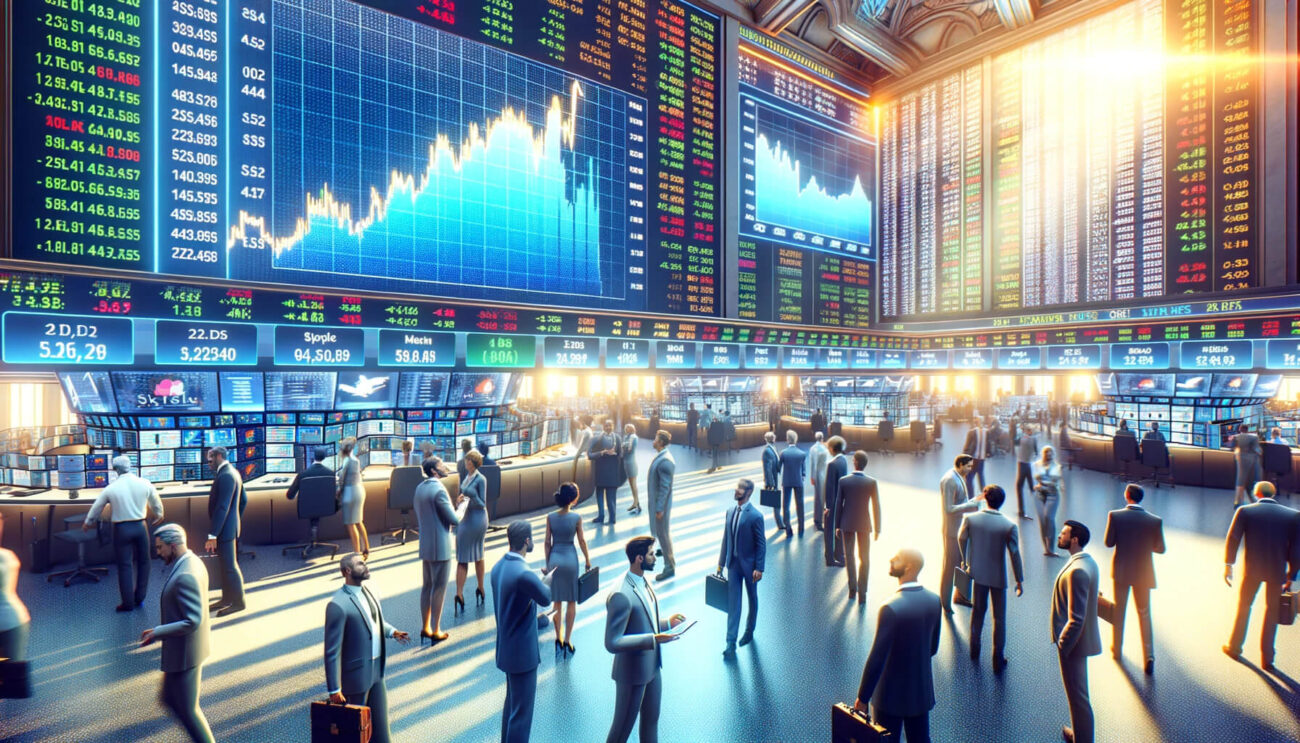The world of trading is fascinating and complex, characterized by constant movements and changes. One of the most prominent features of this dynamic environment is uncertainty, which poses both risks and opportunities. At the heart of trading lies the uncertainty – about market movements, economic developments, and geopolitical events. This uncertainty can be both a challenge and an opportunity for traders.
The importance of dealing with uncertainty in trading cannot be overestimated. Successful traders recognize that uncertainty is an integral part of the trading market. Instead of avoiding it, they learn to deal with it and use it to their advantage. It’s not about eliminating uncertainty – an endeavor that would be doomed to fail – but about developing effective strategies to manage it.
A crucial aspect of dealing with uncertainty is the ability to control emotional responses and make rational, well-informed decisions. The markets can be volatile and unpredictable, and emotional decisions can lead to hasty or risky actions. Successful traders develop a deep understanding of the markets and their own trading strategies, which helps them remain calm and focused even in uncertain times.
Furthermore, adaptability is a key to success in dealing with market uncertainties. The markets are constantly evolving, and strategies that worked yesterday may no longer be relevant today. Traders who learn to stay flexible and continuously adjust their strategies often have an advantage over those who rigidly adhere to outdated methods.
Overall, dealing with uncertainty in trading is a complex but rewarding challenge. It requires a deep understanding of the markets, a controlled emotional response, and the ability to adapt to constantly changing conditions. For traders who develop these skills, consciously dealing with uncertainty opens doors to new opportunities and can be a key factor for long-term success.
Fundamentals of Uncertainty in Trading
Uncertainty in trading manifests in various forms, each with its own challenges and impacts. Market volatility is one of the most visible forms of uncertainty. It refers to the speed and extent to which prices in the markets change. This volatility can be driven by a variety of factors, including but not limited to economic data releases, central bank decisions, or unexpected political events. Traders must learn to accept this volatility as a normal part of the trading process and adjust their strategies accordingly.
Another field of uncertainty is geopolitical events. These can range from elections in key countries to international conflicts. Such events can have profound effects on global markets, often in unpredictable ways. Traders must keep an eye on global political happenings and be ready to respond quickly to new developments.
Economic data also plays a central role in trading uncertainty. Economic indicators such as labor market data, GDP growth rates, or inflation figures can strongly influence market expectations. The challenge for traders is to interpret these data correctly and anticipate how the market might react to them.
The psychological effects of these uncertainties on traders should not be underestimated. Uncertainty can lead to stress, anxiety, and even irrational decisions. This is where mental training for trading plays a pivotal role. It helps traders control their emotions and make rational decisions under pressure. Effective mental training includes techniques such as mindfulness, emotional self-regulation, and the development of a resilient trading psychology. These skills enable traders to cope with the inevitable ups and downs of trading and deliver consistent performance.
Overall, the various forms of uncertainties that traders face present both challenges and opportunities. It is important for traders to understand not only the technical and fundamental aspects of trading but also the psychological impacts of uncertainty and how to manage them. Mental training for trading is key in this regard, as it allows traders to find a balance between knowledge, strategy, and emotional intelligence.
Strategies for Embracing Uncertainty
Embracing uncertainty in trading requires more than just adjusting the trading strategy; it requires a change in mindset. Developing a positive attitude towards uncertainty is an essential step for every trader. It means viewing uncertainty not as a threat but as an inevitable, even beneficial, component of trading. This mindset enables traders to remain open to new opportunities and not be intimidated by the market’s inevitable fluctuations.
To develop such an attitude, it is helpful to view uncertainty as a test of one’s trading abilities. Instead of being overwhelmed by the market’s unpredictability, one can see it as an opportunity to develop flexibility, patience, and discipline. This approach fosters a deeper understanding of the market and strengthens confidence in one’s trading decisions.
Another key strategy for coping with uncertainty is integrating mental training into the daily trading routine. Mental training for trading helps reduce stress and maintain emotional balance. Techniques like deep breathing, meditation, and mindfulness exercises can help maintain calm and make clear, considered decisions. These practices teach traders to recognize and regulate their emotions, rather than being dominated by them.
Additionally, it is important to establish routines and rituals that provide stability and structure. This can be as simple as keeping a trading journal where one records decisions and their outcomes. This not only promotes self-reflection but also helps recognize patterns in one’s trading behavior and learn from them.
Another technique is establishing clear rules for risk management. This includes setting stop-loss and take-profit points to limit risk and avoid emotional decisions. Such rules provide a sense of security, even in the most turbulent market phases.
In summary, embracing uncertainty in trading requires a combination of mental attitude, targeted mental training, and established routines. These strategies help overcome the challenges that uncertainty brings and transform them into a source of strength and growth. By learning to accept and work with uncertainty, rather than against it, traders can not only survive in the world of trading but also thrive.
Decision-making under uncertainty
Decision-making under uncertainty is a central challenge in trading. This challenge requires a balanced interplay of intuition and data-based analysis. Experienced traders know that no single method is sufficient to succeed in the complex world of trading. The ability to effectively use both analytical tools and one’s own intuition forms the basis for sound trading decisions.
First, data-based analysis is indispensable. Modern trading platforms offer a variety of tools and indicators that aid in decision-making. These include technical analysis tools like chart patterns, trend lines, and indicators that provide insights into market sentiments and potential price movements. Fundamental analysis, focusing on economic indicators, company performances, and news events, is also important. These tools enable traders to recognize market trends and make informed assumptions about future movements.
However, relying solely on data and analysis tools can lead to overwhelm. This is where intuition comes into play. It is based on experience and the subconscious processing of information. Intuition allows traders to think beyond pure data analysis and develop a feel for the market. This is particularly useful in situations where the data are incomplete or market conditions are novel.
The art lies in finding a balance between intuition and analysis. A good approach is to use data analysis as a starting point and intuition as a complementary element in the decision-making process. For instance, a trader might identify a trend based on technical analysis and then use their intuition to decide whether it’s the right time to trade or not.
Another important element in decision-making under uncertainty is continuous education and learning from experience. Markets are dynamic and constantly moving, making continuous learning essential. Traders should remain open to new information, techniques, and strategies. Learning from past successes and failures is also important. By reflecting on their past decisions, traders can deepen their understanding of the market and improve their decision-making.
Thus, decision-making under uncertainty in trading is a complex process that requires both analytical skills and intuition. A balanced relationship between these two aspects, coupled with continuous education and experience, enables traders to make informed decisions in an uncertain market environment.
Long-Term Perspectives and Adaptability
A long-term perspective in trading is vital for sustainable success. It allows traders to think beyond the day-to-day and align their strategies with longer-term goals and trends. Such a perspective helps put the significance of short-term fluctuations and losses into the right context and prevents hasty decisions due to temporary market volatility. Instead, the focus is on achieving consistent, long-term gains and strengthening one’s trading position.
To develop this long-term view, continuous education and staying informed are key. This includes studying market trends, following economic news, and understanding global economic interconnections. A deep understanding of market dynamics enables better anticipation of how various events might affect the markets and plan accordingly.
Adaptability is also a key factor for long-term success in trading. Markets constantly change, and strategies that were successful in the past may need to be adjusted or even abandoned to continue succeeding. The ability to quickly adapt to new market conditions is essential. This requires flexibility in thinking, a willingness to relearn, and the ability to integrate new information quickly and effectively.
Another aspect of adaptability is understanding that no strategy is universal. Different market conditions require different approaches. Therefore, traders should have a wide range of strategies and techniques at their disposal to apply depending on the market situation.
In this context, mental training for trading also plays a significant role. It helps traders master the psychological challenges of trading and emotionally adapt to the constantly changing market conditions. Through mental training, traders learn to control their emotions, manage stress, and make clear decisions, even in times of high uncertainty and pressure.
A long-term perspective combined with adaptability and continuous mental training enables traders to withstand the challenges of the market and be successful in the long term. It allows learning from short-term setbacks, continuous development, and refinement of one’s trading strategy. This way, traders can not only survive but thrive in the world of trading.
Key Takeaways to Overcome Uncertainty in Trading
In this article, we have explored the various facets of dealing with uncertainty in trading. From the importance of a positive attitude towards uncertainty to effective risk management techniques and the significance of adaptability to changing market conditions. Mental training for trading has emerged as a key factor in maintaining emotional balance and making clear decisions. These concepts and strategies form a solid foundation for success in the complex world of trading.
We encourage you to integrate the techniques presented in this article into your trading practice. Start with small steps, incorporate mental training into your daily routine, and be open to adjustments in your trading strategy. For more information and support, feel free to visit our shop, subscribe to our newsletter for regular updates, and share your thoughts and experiences in the comments. By continuously learning and applying these techniques, you can steadily improve your trading skills and progress on the path to long-term success in trading.









Leave a comment